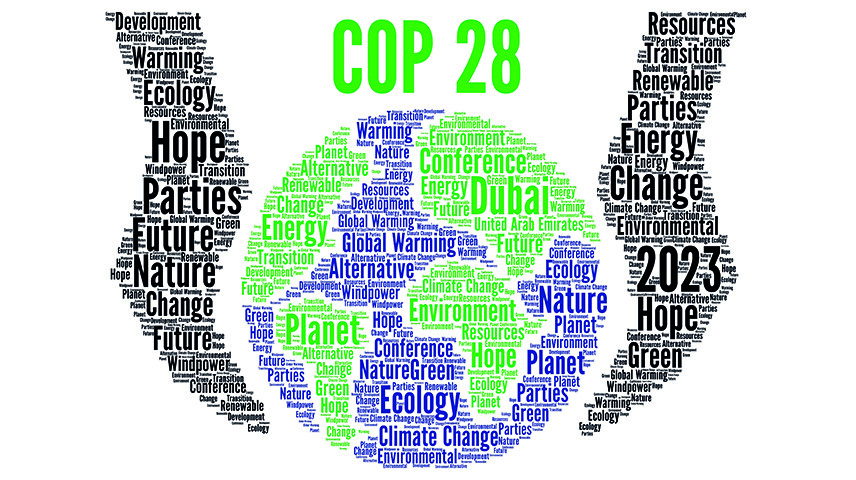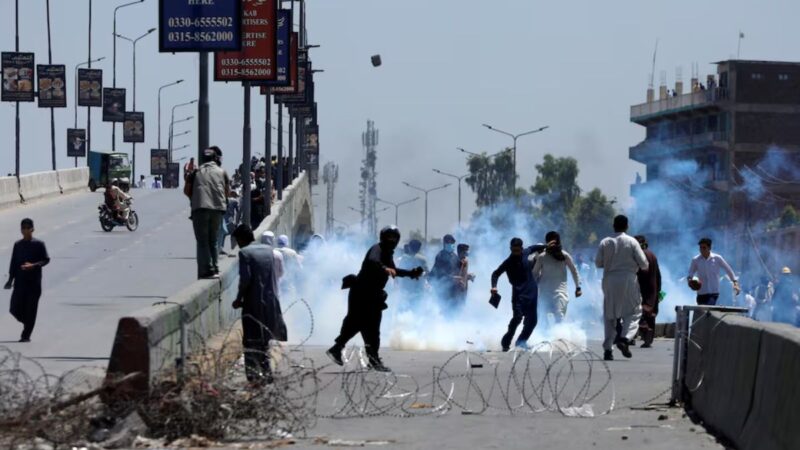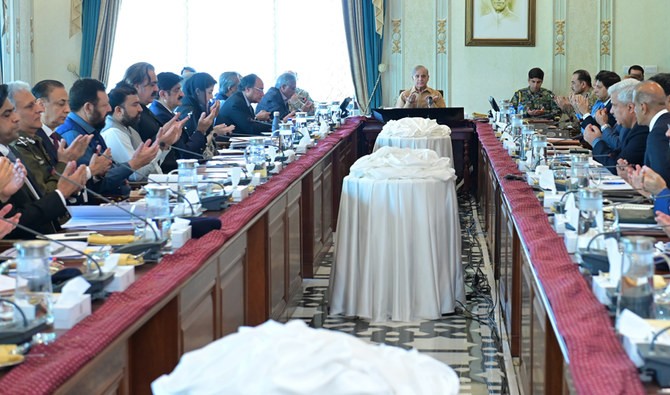Cop 28 And Pakistan: Addressing Climate Challenges And Charting A Sustainable Future

SYNOPSIS
The ongoing COP 28 in Dubai emerges as a pivotal forum for global climate recalibration, pressing nations to enact the Paris Agreement’s mandates. Within this critical discourse, Pakistan’s predicament emerges starkly—a nation grappling with impending economic decline, exacerbated by extreme weather events, environmental degradation, and air pollution. Despite heightened awareness, the translation of concern into actionable policies falters, reflecting systemic challenges in prioritizing climate change. Pakistan’s strategic shift to domestic coal development raises critical questions about sustainable energy alternatives. COP 28 underscores the imperative for nuanced, adaptive leadership to navigate these intricate challenges, positioning Pakistan on a trajectory toward resilience and sustainable growth amid the broader global imperative to combat climate change.
The 28th Conference of the Parties (COP 28) to the United Nations Framework Convention on Climate Change (UNFCCC) is currently underway in Dubai, United Arab Emirates. COP 28 is the annual meeting of the UNFCCC, which is the world’s only multilateral decision-making forum on climate change. All 197 Parties to the UNFCCC are expected to attend COP 28, being held from November 30 to December 12, 2023.
It is now time to put the Paris Climate Change Agreement into action. COP 28 is a critical opportunity to accelerate global efforts. Science shows that greenhouse gas emissions must be reduced by 43% by 2030 compared to 2019 levels to limit temperature rise to 1.5 degrees Celsius and avoid the most severe consequences of climate change. COP 28 aims to identify global solutions to limit temperature rise, inform countries’ revised and more ambitious climate plans, accelerate the green transition, and ultimately achieve the goals of the Paris Agreement.
A crucial aspect of COP28 will be the evaluation of climate action under the Paris Agreement, culminating in the first Global Stocktake at the Dubai Summit. This two-year undertaking has entailed gathering data on parties’ climate efforts and pinpointing areas for improvement, providing a comprehensive assessment of the Agreement’s implementation. COP28 will adopt a resolution reflecting the stocktake’s findings and charting the course for future climate action. This is anticipated to include renewed commitments from governments. The Global Stocktake report, released in September, underscored that the world is not on track to meet the Paris Agreement’s objectives.
Against this background, it is worthwhile to note that Pakistan has been one of the worst offenders on the climate front. In October, 2022, Secretary-General António Guterres told the UN General Assembly that the people of Pakistan were victims of “a grim calculus of climate injustice”, on account of man-made climate change”.
In December 2023, the World Bank has cautioned that Pakistan’s economic growth is projected to plummet by 18 to 20 percent by 2050 as a consequence of intensifying extreme weather events, worsening environmental degradation, and escalating air pollution, according to a report in the Pakistan based English newspaper Tribune.
Despite widespread concern about the impact of climate change on children, Pakistanis do not prioritize addressing climate change as a top issue.While educating the public about climate change is gaining recognition as a crucial step, it is far from a straightforward task. Distrust of climate information sources is particularly prevalent among those with lower levels of education. This poses a significant challenge in devising effective strategies to enhance climate change awareness for this group, which also happens to be the least informed and most distrustful of available information sources.
Effective climate change policies and programs require an understanding of what hinders individuals from taking action. One crucial factor to consider is the level of communication and discussion about climate change within households. While data indicates widespread support for incorporating climate-related education into school curricula, less than half of parents engage in discussions about climate change with their children at home. This discrepancy suggests a potential gap between awareness and action, emphasizing the need for initiatives that promote household-level discussions and actions. Moreover, it underscores the potential role of schools in fostering open dialogue and educating families about climate change issues.
While the growing demand for climate change education in schools indicates a promising avenue for driving action on this critical issue, its effectiveness may be hampered by the lack of similar discussions in students’ homes. This concern exists across all educational levels, regardless of location. Despite slightly more frequent discussions in urban compared to rural areas, the overall absence of home-based dialogue poses a significant obstacle to schools’ potential influence in shaping students’ climate action. Therefore, developing strategies to foster climate conversations both within and beyond the classroom is essential.
This general pattern may now be illustrated with an example. The World Bank report reveals the public’s understanding of the issue. A significant majority, 70%, believe air pollution can trigger asthma, while 46% recognize its link to heart disease. These concerns are well-founded, as research has established the detrimental impacts of air pollution on children’s health. Exposure to air pollution damages children’s respiratory, immune, and cardiovascular systems, raising the risk of cancer, particularly leukemia and lymphoma. Cognitive development is also affected, leading to lower learning ability, behavioural issues, and mental disorders. The study also highlights the perceived impact of air pollution on productivity and attendance. Over 64% of respondents believe it affects student performance, while 50% and 49.2% believe it impacts student and worker attendance, respectively. Similarly, 53.2% believe it affects worker performance.
However, when Participants were asked if they believed actions like avoiding outdoor activities, keeping windows closed, avoiding busy roads, and improving ventilation could lessen the impact of air pollution, many acknowledged the effectiveness of these measures, but few reported actually taking any action in the past month. This highlights a potential gap between knowledge and action regarding air pollution mitigation strategies. While the average Pakistani might be worried about the consequences of climate change, this anxiety doesn’t always translate into tangible action.
The World Bank stressed the importance of shifting the conversation around climate action. Instead of solely focusing on environmental consequences, they encourage strategies that frame climate action as a financially beneficial path. To effectively implement these strategies, the report highlights the necessity for extensive research exploring the complex factors that influence individual perceptions and behaviors regarding climate change in Pakistan. Notably, the report suggests a link between personal experiences with income shocks, such as the COVID-19 pandemic or flood-related losses, and heightened concern about climate change’s impact.
Pakistan, home to over 220 million people, is grappling with a complex web of challenges. These include political instability, rising external debt, energy shortages, and the devastating effects of climate change. As a nation where agriculture forms the backbone of the economy, contributing roughly 21% of GDP, these crises are particularly impactful. With 62% of its population residing in rural areas and directly or indirectly reliant on the land, Pakistan is acutely vulnerable to the impacts of a changing climate.
In 2023, Pakistan reversed its policy on coal, abandoning its previous commitment to a moratorium and announcing plans to quadruple its domestic coal-fired power capacity. This dramatic shift was driven by a desire to reduce dependence on imported gas and meet energy needs. Pakistan’s ambitions to increase its reliance on renewable energy have faced significant hurdles, including inconsistent policy, expensive capital, and insufficient domestic funding. In FY2022 (July to April), non-hydropower renewable energy sources contributed a meager 3% to the country’s overall energy generation. This progress could be further hampered by Pakistan’s decision to prioritize domestic coal development as a quick fix to reduce dependence on imported oil and gas.
The escalating threat of flash floods in Pakistan has been exacerbated by the multifaceted challenges of climate change that takes the centre stage at COP 28. As UN Secretary-General António Guterres notes, Pakistan is contending with a ‘monsoon on steroids,’ exemplified by the extreme floods in 2022 that submerged a third of the country, disproportionately affecting rural areas in Balochistan and Sindh. The direct cause lies in unprecedented monsoon rains, reaching 190% above normal levels. Yet, the root of such extremes extends to climate change, evidenced by melting glaciers and the heightened frequency of extreme weather events.
Despite Pakistan contributing less than one percent to global carbon emissions, it ranks among the ten most vulnerable countries to climate change. The disproportionate impact on the poorest and most vulnerable communities, lacking resources and fall-back options, underscores the urgent need for proactive measures. Chief Executive of Islamic Relief Worldwide, Waseem Ahmad, emphasizes that preparedness is key, highlighting the importance of empowering communities to predict, prepare, and mitigate the impacts of disasters.
At COP 28, Pakistan’s predicament intertwines with global discussions on climate action. The World Bank’s projections underline the urgency, projecting dire consequences for economic growth and public health due to the interplay of extreme weather, environmental degradation, and air pollution. The country’s predominantly agrarian society, coupled with the reversal of coal policy, necessitates a comprehensive and resilient climate strategy. Such an approach is crucial not only to mitigate the devastating consequences of flash floods but also to pave the way for a sustainable future for Pakistan, aligning with the broader global efforts to address the climate crisis. Pakistan’s political turmoil and inconsistent climate action demand strong leadership to navigate toward a sustainable and climate-resilient future.
*Dr. Maheep is an expert in International Relations and Global Politics. He observes and actively contributes to the nuanced discussions surrounding COP 28 and climate diplomacy.






